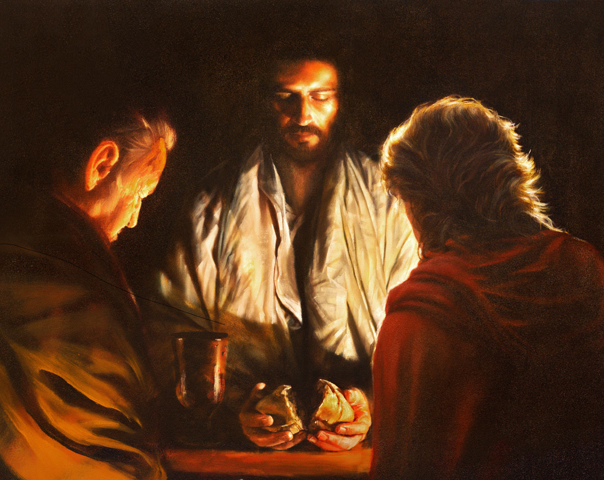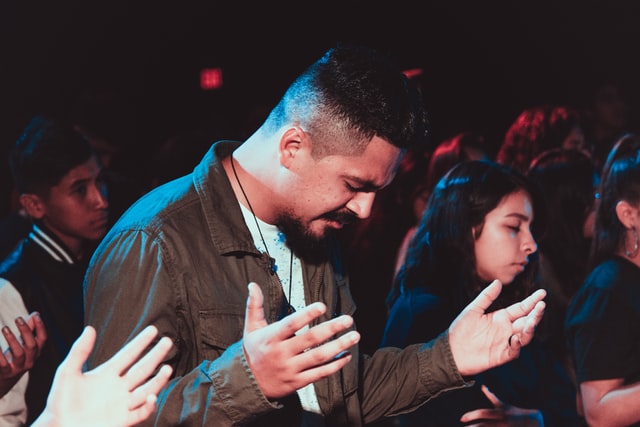By Brother Julio+ February 28, 2021
.

…I have called you friends,
for all that I have heard from my Father I have made known to you —John 15:15
.
Being a Christian is about You and Jesus
Let us go to the heart of the matter from the beginning. You cannot claim to believe in Jesus without having an encounter with Him in a very personal way. Being a disciple of Jesus doesn’t mean to follow a philosophy or a religion. Following after Jesus is a very direct and personal experience.
The Bible tells us that a follower of Christ is someone who has experienced such a unique and radical event in their lives that they are compared to someone who has been born again. It really is about a second birth—a spiritual one—and it is totally the doing of God the Holy Spirit through the waters of baptism. (John 1:11-13; 3:3-8; Titus 3:3-5; 1 Peter 1:3)
Being a Christian, then, is not just about being religious. It is about being united to Christ by the Holy Spirit of God, and living according to that new reality.
Some Christians were baptized as infants, others later in life. However, regardless of their age at baptism, it is a sad reality that some forsake their baptism. Fortunately, some of them also experience a radical conversion that brings them back to Christ.
It is also true that others have never departed from their baptismal vows. Their conversion stories are perhaps less dramatic, but they are no less real. Conversion is still their common denominator because, in the Christian life, conversion is not a once-and-for-all event. It is a daily necessity (Luke 9:23-25).
Regardless of the ups and downs in their spiritual journey, the lives of faithful Christians are defined by that personal, transforming encounter with their Lord and savior Jesus Christ. Jesus called it “an abundant life” (John 10:10).
The Holy Scriptures also depict such abundance in terms of the bountiful fruit from good trees:
The fruit of the Spirit is love, joy, peace, patience, kindness, goodness, faithfulness, gentleness, self-control… If we live by the Spirit, let us also keep in step with the Spirit. (Gal. 5:22-25, ESV).
Again, this life is only possible by the power of the Spirit of God—and a continued response to His grace and guidance.
For a world without Christ this life is foolishness—it cannot be understood, much less lived out (1 Cor. 2:14; Rom. 8:6-8)
For a Christian living in step with God the Holy Spirit, however, “love, joy, peace…” are powerful, personal realities. It is like an internal engine that moves their entire way of life.
.
Being a Christian is NOT just about you and Jesus
Many Christians, especially those from the evangelical tradition who tend to overemphasize the individual aspect of the Christian life, will likely agree with all or almost all of the above.
But there is more to a healthy and mature Christian life than a personal, individual relationship with God, as important as that is. Following Christ is also a very communal experience.
.
Four distinctive marks of strong Christians
To consider this communal aspect of the Christian life let us meditate on a brief but compelling summary of the lifestyle of those first believers who totally gave their lives to Christ as their personal Lord and savior:
So those who received his word were baptized, and there were added that day about three thousand souls. And they devoted themselves to the apostles’ teaching and the fellowship, to the breaking of bread and the prayers […] And all who believed were together and had all things in common […] And day by day, attending the temple together and breaking bread in their homes, they received their food with glad and generous hearts. (Acts 2:41-46, ESV).
To a world without Christ, the early Christians were nothing more than a bunch of religious fanatics. It was impossible for them to understand what moved them to live in this radical way.
But if you are a follower of Jesus, practicing what those early Christians practiced is your goal, your desire, and your passion. If it isn’t, we should ask ourselves why, or if we still remain in the faith (2 Cor. 13:5).
We see, then, that after that personal encounter with Christ through repentance, faith and baptism, they followed Christ by devoting themselves to 1) the apostles’ teaching, 2) to fellowship, 3) to the sacrament of the Eucharist (“the breaking of bread”) and 4) the prayers.
However, if we read carefully, these four Christian distinctives can only be practiced in community. It is not possible to have a healthy spiritual life by living as a kind of Lone Ranger Christian.
.
1) Apostolic teaching

It is simply impossible to persevere in the doctrines of the apostles by reading the Scriptures alone. The Apostle Peter warns us, for example, that among Saint Paul’s writings
…there are some that are difficult to understand and that the ignorant and fickle twist, as they also do with the other Scriptures, to their own perdition. (2 Peter 3:15-16, ESV)
This is one of the reasons why the Bible explicitly prohibits the private interpretation of the Holy Scriptures (2 Peter 1:20-21).
For that reason, as well, the Holy Spirit has given the Church the gift of
…shepherds and teachers… for building up the body of Christ… to mature manhood… so that we may no longer be children, tossed to and fro by the waves and carried about by every wind of doctrine. (Eph. 4:11-14, ESV).
To avoid the error of interpretations disconnected from the consensus of the universal Church (private interpretations), the early Church required that those responsible for the teaching of the faith (mostly bishops, presbyters and deacons) be in apostolic succession (see Titus 1:1, 4-9).
It is self-evident that this apostolic authority and authenticity cannot be received with certitude outside of the historical apostolic community. One cannot transmit that which has not received.
This is why claims to divine truth that are a-historical innovations by self-proclaimed charismatic leaders are always at the origin of heresies and sects.
In other words, if you are to be a mature Christian, you and your Bible alone are not enough.
.
2) The Holy Eucharist

Regarding the Holy Eucharist, I don’t think that it is necessary to explain in detail the impossibility, or at least how inappropriately it is, to celebrate Holy Communion privately (see 1 Cor 10:16-17).
Building upon the above-mentioned concept of apostolic succession, it should also be obvious that those who have
not received the sacrament of holy orders to the priesthood (bishops and presbyters) cannot celebrate the Holy Eucharist on their own authority.
They simply have not received the charism (ability and potestas) to be icons or mirrors of Christ in the priestly ministry of the blessing and the offering of bread and wine to be the Body and Blood of Christ:
… grace [has been] given me by God to be a minister of Christ Jesus … in the priestly service of the gospel of God, so that the offering … may be acceptable, sanctified by the Holy Spirit. (Rom. 15:15-16, ESV).
This means that just as a priest cannot act independently from the Body of Christ/Christian community, the community of the laity cannot act independently from their Bishop and presbyters, either.
It is true that in the Roman tradition priests are allowed to celebrate the Holy Eucharist in the absence of the pleroma (the congregation of the faithful lay people). Nevertheless, this has not been the universal practice of the Church in all times and in all places. Therefore, the catholicity of this tradition is questionable at least. [1]
However, in special circumstances, such as when imprisoned, or confined for other reasons, and in these abnormal times of pandemic, it is possible to receive spiritual communion privately. But this is no longer the sacrament itself.
.
3) The prayers

When we come to prayer, which is very personal in essence, we find that this, too, must be practiced in community.
We notice that, in its original language, the biblical text does not simply say that early Christians devoted themselves to prayer, but to the prayers.
The presence of the definitive article suggests that these were particular and specific prayers, as opposed to generic or off-the-cuff. These were prescribed liturgical prayers—fixed and established prayers said in community at fixed and established hours.
Indeed, the book of Acts of the Apostles and history tell us that early Christians continued that venerable Jewish practice of liturgical hours of prayer. Among these, the sixth and the ninth hours stand out (Acts 3:1; 10:9)
Liturgical or communal prayers are important because they remind us that we are not just praying as isolated individuals with our own prayers. We are joining ourselves to that “great cloud of witnesses,” past and present, throughout all ages and throughout all places.
The Daily Office, also known as Divine Office or Liturgy of the Hours, continues that ancient Jewish and apostolic tradition of praying throughout the day and night at set times.
In continuity with this time-tested and most beneficial practice, the Anglican Church has preserved the compulsory praying of the Daily Office for those in holy orders (bishops, priests and deacons), for those under vows of monastic life, and strongly encouraged for all.
Since the times of the English Reformation the Daily Office has been made available to the laity by their inclusion in the Book of Common Prayer. It has also been simplified, consisting mainly of morning and evening prayer, and to a lesser extent noon prayer and Compline (before bedtime).
All of this, of course, does not mean that Christians cannot pray privately. It only means that Christians must persevere and devote themselves to adding communal prayer to their personal prayer life.
.
4) Mutual companionship (fellowship)

We finally arrive to the practice of fellowship, which I left for last not because it is of lesser importance, but rather to emphasize it.
Even though Christian fellowship is a well-known Christian concept in our days, it is frequently neglected.
I suspect that it is because it has not been given the right meaning or the emphasis it has in the Scriptures.
Out of those four marks of mature Christians, by definition, this one is literally impossible to practice alone.
In the New Testament the word usually translated as fellowship, communion, union, participation, contribution, distribution, among others, is the Greek term koinonia.
We have to use all of these different words to translate it because it is difficult to capture in a single English word the rich and deep meaning of this Biblical concept.
Christian koinonia is a very intimate communion (a common-union), even at the level of the spirit, with others who equally participate in the life of Christ.
When we were put into Christ (a vertical union) by virtue of our common baptism (Rom. 6:3), we joined a Corpus, the Body of Christ. Once in Christ, we find ourselves united to other Christians who are also members of the same Body (a horizontal union, Eph. 4:4-6).
It is not possible to be united to Christ and live independently from other Christians.

It is not possible to have a healthy spiritual life by living as a kind of Lone Ranger Christian.
This common-union is a spiritual reality, regardless of our attitudes or external ways of relating to other Christians. However, this does not imply that our communion is only spiritual or invisible.
Even the partaking of the Holy Eucharist, which private devotion tends to focus on a purely personal and intimate union with Christ, has a quintessential communal reality.
This is so because the Body of Christ is both in the Eucharist and in the gathered Christian community. As the great Eastern tradition reminds us, the Church as the Body of Christ is actualized and affirmed in the Holy Eucharist, the Body of Christ (1 Cor. 11:27-29).
Again, union with Christ is at once union with the rest of the Body of Christ.
These are a few biblical passages that highlight the importance of Christian koinonia for a healthy spiritual life:
But to do good and to communicate [koinonías] forget not: for with such sacrifices God is well pleased. (Heb. 13:16, KJV)
That which we have seen and heard we proclaim also to you, so that you too may have fellowship with us; and indeed our fellowship is with the Father and with his Son Jesus Christ. (1 John 1:3, ESV)
If we say we have fellowship with him while we walk in darkness, we lie and do not practice the truth. But if we walk in the light, as he is in the light, we have fellowship with one another, and the blood of Jesus his Son cleanses us from all sin. (1 John 1:6-7, ESV)
As we can see, Christian koinonía is indispensable in the Scriptures. It serves as the foundation to the expression of Christian love, that quintessential virtue at the top of all others, which can only exist in relation to others. It is definitely not optional.
Consequently, a Christian who is not actively engaged in developing fraternal friendships beyond casual and superficial interactions with other Christians, is seriously lacking in their spiritual life (1 Cor. 3:1-3; 13:1-11)—and probably in their mental and emotional life as well.
Although in a different context, there is a dreadful picture portrayed in Psalm 102 that seems to capture very well the diminished existence of a life deprived of koinonía. It is the internal loneliness of a life lacking brotherhood and true friendship:
“I am like a lonely desert owl, like an owl among the ruins.
I have become like a bird alone on a roof.” —Psalm 102:6,7b
.

.
.
Brother Julio+
– + –
.

